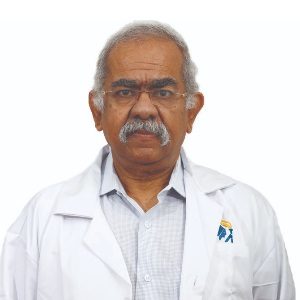Best Doctors in India for Whipple Procedure
- Surgical Gastroenterologist, Chennai, India
- Over 27 years’ experience
Profile Highlights:
- Dr. Surendran R is an experienced gastroenterologist from Chennai, Tamil Nadu.
- He has been rewarded for his contributions to the field several times. He received The Best Doctor award from the Tamil Nadu government (2002) in his name.
- Being a gastroenterologist, he specializes in treating patients with problems such as Bowel Obstruction, Pancreatic diseases, Esophagus disorders, Fistula treatment, etc.
- Gastroenterologist and GI Medicine Specialist, Chennai, India
- Over 23 years’ experience
Profile Highlights:
- Dr. Revathy Shanmugam is an experienced Gastroenterologist in Tamil Nadu, having an experience of 23 years in the management of GI disorders, Training & Teaching.
- She is highly skilled in the services like Liver Disease Treatment and Inflammatory Bowel Disease (IBD) Treatment.
- She has published various scholarly works in many National & International Publications of Medical Gastroenterology.
- Gastroenterologist and GI Medicine Specialist, Chennai, India
- Over 32 years’ experience
Profile Highlights:
- Dr. Hariharan Muthuswamy is a veteran Gastroenterologist and Hepatologist in India with 22 years of experience (specialist).
- Dr. Muthuswamy treated his patients with Non-Surgical Piles treatment, Liver Disease Treatment, Hepatitis E, Hepatitis A Treatment and Hepatitis B Treatment, Hemorrhoids Treatment, Colonoscopy, Stomach, and Intestinal Treatments, etc.
- He has a special interest in Capsule Endoscopy, Therapeutic Endoscopy, GERD, and Irritable Bowel Syndrome (IBS).
- Gastroenterologist and GI Medicine Specialist, Chennai, India
- Over 32 years’ experience
Profile Highlights:
- Dr. Mohan A T is a veteran GI medicine specialist in India with an experience of 32 years.
- Dr. Mohan, an alumnus of Madras University, is the Co-Ordinator of the Indian Society of Enteral and Parenteral Nutrition.
- He is an expert in treating Gastritis, acidity, Ulcerative Colitis, and many other Intestinal and bowel-related Treatments. In addition to these, he offers Colonoscopy, Gastroscopy, and Endoscopy.
- Gastroenterologist and GI Medicine Specialist, Chennai, India
- Over 15 years’ experience
Profile Highlights:
- Dr. Piramanayagam P is one of the young Gastroenterologists in India, having an experience of 15 years in the field.
- The doctor offer services like Gall Bladder (Biliary) Stone treatment, IBS treatment, Acidity Treatment, Endoscopy, and stomach and intestine dysfunction.
- He published many review articles and books under his name.
- Gastroenterologist and GI Medicine Specialist, Chennai, India
- Over 39 years’ experience
Profile Highlights:
- Dr. Sarojini Parameswaran is one of the renowned Gastroenterologist with an overall experience of 39 years.
- Dr. Parameswaran is brilliant and quick with diagnosis. She has 22 years of specialist experience.
- Gastroenterologist and GI Medicine Specialist, Chennai, India
- Over 24 years’ experience
Profile Highlights:
- Dr. Seshadri Venkatesh P is a well-known Gastroenterologist in India, having 24 years of experience in Stomach and Intestine disorders.
- Dr. Seshadri acquired proficiency in managing Bladder Cancer surgery, hemorrhoids, Irritable Bowel Syndrome (IBS) Treatment, etc.
- He holds membership in Tamil Nadu Medical Council.
- Gastroenterologist and GI Medicine Specialist, Chennai, India
- Over 40 years’ experience
Profile Highlights:
- Dr. Usha Srinivas is a Gastroenterologist in India with an experience of 40+ years in GI in medicine and academics.
- Patients visit her for consultation and treatment of abdominal pain, Gall Bladder (Biliary) Stone, Gastroenteritis, Jaundice, Colonoscopy, Steatosis, Constipation Treatment, Hepatitis C Treatment, Hepatitis E Treatment, Hemorrhoids Treatment, Piles Treatment (Non-Surgical), Gastritis Treatment, Ulcerative Colitis Treatment, and others.
- Gastroenterologist and GI Medicine Specialist, Chennai, India
- Over 18 years’ experience
Profile Highlights:
- Dr. Preethi M is one of the best gastroenterologists in India, with 18 years of expertise.
- Dr. Preethi received many awards for her contribution to the field.
- She offers consultation for Irritable Bowel Syndrome (IBS), Hemorrhoids, Endoscopy, female problems, and other gastrointestinal issues.
- Gastroenterologist and GI Medicine Specialist, Chennai, India
- Over 23 years’ experience
Profile Highlights:
- Dr. Ubal Dhus is a GI specialist doctor in South India who is proficiently managing Gastroenterological disorders for the past 23 years.
- He acquired his medical degree from Madras University, Chennai, and served people with Hemorrhoids Treatment, and Irritable Bowel Syndrome (IBS) Treatment.
Best Hospitals in India for Whipple Procedure
Venkateshwar Hospital, Dwarka, New Delhi
- City: New Delhi, India
Hospital Highlights:
- State-of-the-art technology and devoted healthcare professionals have been brought together under one roof at Venkateshwar Hospital to provide genuine medical care. The hospital’s professionals work together as a team to deliver the best possible treatment to their patients, using the most sophisticated equipment and information technology.
- Venkateshwar Hospital’s mission is to attain global excellence in healthcare by employing evidence-based, ethical clinical practices and cutting-edge technology by a team of highly skilled experts.
MGM Healthcare, Chennai
- City: Chennai, India
Hospital Highlights:
- Located in Chennai, India, MGM Healthcare is a top multispecialty hospital that provides all medical services under one roof.
- Since its founding in 2019, MGM Healthcare has quickly become a leading national referral centre, creating several innovative flagship initiatives.
- MGM Healthcare combines next-generation medical and digital technologies to provide better patient results.
- With 12 centres of excellence, more than 400 inpatient beds, 100 intensive care unit beds, and 24/7 emergency care, MGM Healthcare leaves no chance in redefining the patient experience in Chennai.
- MGM Healthcare boasts 250+ expert doctors across 30+ departments, including Cardiology, Pulmonology, Neurology, Obstetrics & Gynaecology, and more.
- They house 12 specialized Centres of Excellence, including Neurosciences, Orthopaedics, and Multi-Organ Transplantation.
- Their team of doctors, nurses, and paramedics works together to give every patient individualized treatment.
Whipple Procedure
Whipple procedure or pancreaticoduodenectomy is a medical procedure involving the removal of the head of the pancreas, the duodenum (first part of the intestine), the bile duct and the gall bladder.
Doctors perform this complex operation to treat tumors and disorders related to the intestine, pancreas and the bile duct. It is the most common surgical procedure for the treatment of pancreatic cancer that does not extend beyond the head of the pancreas. After the procedure, your doctor will reconnect the remaining organs to allow easy digestion of the food you eat after the surgery. The Whipple procedure is a lifesaving procedure for people suffering from pancreatic cancer.
Who needs the Whipple procedure?
Approximately 25% of the patients suffering from pancreatic cancer need the Whipple procedure. This is mainly because the tumors of these patients remain confined to the pancreas (head of the pancreas) and do not spread to the surrounding blood vessels, lungs, liver and/or the abdominal cavity. One can go for intensive testing to understand he or she needs the Whipple procedure. In some cases, the doctors perform laparoscopic Whipple procedure by making several small incisions rather than a single large incision. Ultimately, there is lesser blood loss, quick recovery, a short stay at the hospital and fewer complications.
Around 40% of the patients are diagnosed with tumors when they spread beyond the pancreas and are not eligible for the Whipple procedure. However, it is an option rarely for 40% of the patients having a locally advanced disease that continues to spread to the nearby areas or for the patients whose tumors continue to spread to the tail or body of the pancreas.
When should you opt for the Whipple procedure?
Whipple procedure is an option for you if cancer of any other disorder affected your duodenum, pancreas or bile duct. The Whipple procedure is done for cancer for the removal of the tumor and to prevent the growth & spread of the tumor to the surrounding organs. Pancreas, present behind your stomach in the upper abdomen, works with the ducts and the liver carrying bile. The enzymes secreted by the pancreas held in the digestion of food. It also secretes hormones that help to regulate your blood sugar level. Your doctor will recommend the Whipple procedure to you if you have:
- Pancreatic cysts
- Pancreatitis
- Bile duct cancer
- Small bowel cancer
- Other disorders or tumors that involve your pancreas, bile ducts or duodenum.
- Pancreatic cancer
- Pancreatic tumors
- Ampullary cancer
- Neuroendocrine tumors
- Trauma to the small intestine or the pancreas
What to expect?
Before the procedure
You need to check-in and register on the day of the surgery. The staff at the hospital will confirm your appointment, procedure, timings and your appointed surgeon. Your nurse will ask you to change and wear a surgical gown for the surgery. Your doctor will put up an intravenous line (IV line) into the vein of your arm before the surgery. He or she will inject medications and fluid into your veins through the IV line. If you are nervous, then your doctor may also give you some medications to relax you. He or she may place you under an epidural catheter or a spinal injection apart from local nerve blocks in your abdominal wall. This helps in easier and faster recovery without causing any discomfort or pain to you after the surgery. This also decreases the amount of medication for narcotic pain that you may need.
During the procedure
The team will take all the necessary measures and follow all the protocols to ensure that you have effective and safe surgery. The team comprises of pancreatic surgeons, anesthesiologists & anesthetists, specialized surgical nurses, nurses and doctors trained for the surgery. They will administer anesthesia (sleeping medicine) to you.
After you sleep, the doctors will place additional intravenous lines along with other monitoring devices according to the complexity of the condition and your overall health. The team will then, insert a urinary catheter into your bladder. It will drain urine during the surgery and after the surgery. You can remove it after one to two days from the day of surgery. The surgery may require around 6-12 hours which depends on the approach the team is using and the complexity of the surgery. Done under general anesthesia, you will be unaware and fell asleep during the Whipple procedure.
Your surgeon will make an incision or cut in your abdomen to gain access to your internal organs. The size of the incision and its location will depend on the particular situation and the approach of your surgeon. Your surgeon will remove the duodenum (the beginning of the small intestine), the bile duct, the head of the pancreas and the gall bladder in the Whipple procedure. He or she may also remove a part of your stomach or the nearby lymph nodes. Your doctor may perform some other type of pancreatic operations also that depends on the situation.
After the procedure
Most of the people directly shift to the general ward after the surgery for their recovery. The team will monitor your condition and the improvements in your health regularly at various times of the day. Furthermore, they will carefully look out for any complications or signs of infection. Some people even get to walk out of the hospital on the day of the surgery. For your overall recovery, you may expect to stay at the hospital for a week. If your case is complex or you have certain medical conditions, the doctor will admit you to the ICU after the surgery. The nurses in the ICU will regulate your condition and watch for complications if any. The team will give you medications, fluids and nutrition through intravenous (IV) lines.
A urinary catheter will drain urine from the urinary bladder while other tubes will drain blood and fluid from the surgical area. People suffering from particular health conditions or old adults may need to stay in a rehabilitation facility for a few days. Many people can perform their routine activities within four to six weeks from the day of surgery. Your physical condition before the surgery and the complexity of the operation will govern the time required by you for recovery.
Risks
The Whipple procedure is a complex operation that involves open surgery in many cases. There are associated risks during and after the procedure. These risks may be:
- Infection at the site of the incision or within your abdomen
- Weight loss after the surgery
- Development of the fistulas or false channels
- Leakage from the connection of the bile duct or the pancreas
- Bleeding at the site of the surgery
- Diarrhea for two to three months
- Diabetes because of the removal of excess insulin-producing cells from the pancreas.
- Delayed stomach emptying which makes it difficult to keep food down or to eat.
If a highly experienced surgeon is performing the procedure then there are fewer chances of complications. You must ask your surgeon about his or her experience apart from their hospital’s experience regarding Whipple procedure and operations related to the pancreas.















